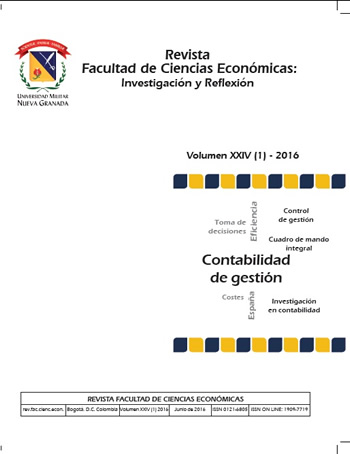Culture approach from accounting research: possibilities of re - significance
Abstract
The concept of culture has worked in accounting primarily to evaluate differences in accounting systems and management control between countries, the above is intended to characterize and compare all the main elements that impact accounting and control in the national cultures. Hofstede's work (1980, 1984) is the main reference for accounting research in the field of culture, however it does not escape questioning by not taking into account the construction of disciplines that study the cultural phenomenon, such as cultural anthropology, history, sociology, among others. This paper outlines the frames and benchmarks of cultural anthropology as an important element of the culture analysis, subsequently the references used by accounting for the study of culture are outlined, the application in its studies and the emerging criticism.Downloads
References
Amat, O., Falguera, J., Puig, X. & Soldevilla, P. (2003). Aspectos que influyen en las diferencias internacionales en materia de contabilidad de gestión. Revista iberoamericana de contabilidad de gestión, 1(1).
Amat, O.; Blake, J.; Wraith, P. & Oliveras, E. (1999). Dimensions of national culture and the accounting environment — The Spanish case. Department of Economics and Business, Universitat Pompeu Fabra.
Bhimani, A. (1999). Mapping methodological frontiers in cross-national management control research. Accounting, Organizations and Society, 413 - 440.
Bhimani, A. (2003). A study of emergence of accounting management system ethos and its influence on perceived system success. Accounting, Organizations and Society, 28, 523 - 548.
Doupnik, T.S. & Salter, S.B. (1995). External environment, Culture and Accounting Practice: A Preliminary Test of A General Model of International Accounting Development. International Journal of Accounting, pp. 189-207.
Finch, N. (2010). Towards an understanding of cultural influence on the international practice of accounting. Journal of International Bussiness and Cultural Studies. Vol. 2. 1 – 6.
Geertz, Clifford (1992). La interpretación de las culturas. Gedisa. México.
Giménez, Gilberto (2000). Territorio, cultura e identidades. Cultura y región. CES, Universidad Nacional de Colombia, Ministerio de Cultura. Colombia.
Giménez, Gilberto (2007). Un recorrido a través del concepto de cultura. Estudios sobre la cultura y las identidades sociales. Conaculta - Iteso. México.
Gray, S. J. (1988). Towards a Theory of Cultural Influence on the Development of Accounting Systems Internationally. ABACUS, Vol. 24, No. 1, 1988, pp. 1 – 15.
Gray S.J. & Vint H.M. (1995). The impact of culture on accounting disclosures. Some international evidence. Asia Pacific Journal of Accounting, December, pp. 33-44.
Harris, Marvin (2009). Antropología cultural. Decima reimpresión. Alianza editorial, Madrid.
Harrison, G. L., & McKinnon, J. L. (1999). Cross-cultural research in management control systems design: a review of the current state. Accounting, Organizations and Society, 483 - 506.
Hofstede, G. (1980). Culture’s consequences: International differences in work-related values. Beverly Hills, California. Sage.
Hofstede, G. (1984). Culture’s consequences: International differences in work-related values. Beverly Hills, California. Sage.
Hofstede, G. (1984). The cultural relativity of the quality of life concept. Academy of Management Review, 27, 389 – 398.
Jarne, J.I. (1997). Clasificación y Evolución Internacional de los Sistemas Contables. Asociación Española de Contabilidad y Administración de Empresas. Madrid.
Martin, J. (1992). Cultures in organizations: three perspectives. Oxford: Oxford University Press
Merchant, K. A., Chow, C. W., & Wu, A. (1995). Measurement, evaluation and reward of profit center managers: a cross-cultural field study. Accounting, Organizations and Society, 20, 619 – 638.
Pourjalali & Meek G. (1995). Accounting and Culture: The case of Iran. Research in Accounting in Emerging Economies, 3, 3-17.
Schein, E. H. (2010). Organizational culture and leadership. San Francisco, CA.: Jossey Bass.
Seidler, L. J. (1967). International Accounting – the Ultimate Theory Course. The Accounting Review.
Seymour-Smith, C. (1986). Macmillan dictionary of anthropology. London: Macmilllan Press Lmt.
Tsui, J. S. (2001). The impact of culture on the relatioship between budgetary participation, management accounting systems and managerial performance: An analysis of Chinese and Western managers. International Journal of Accounting, 36, 125 - 146.











